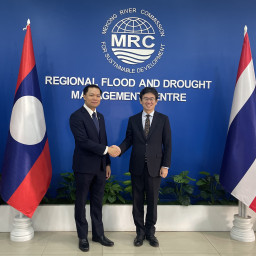The European Union provides over 6 million USD to tackle climate change in the Mekong
Luang Prabang, Lao PDR, 16 January 2013—The European Union (EU) today committed 4.95 million EUR (over USD 6 million) to the Mekong River Commission (MRC) to boost its efforts in responding to the region’s climate change challenges.
The funding goes towards the Climate Change Adaptation Initiative (CCAI) until 2015. It supports the MRC programme to assess the effects of climate change and integrate adaptation planning at the regional, national and community levels. The funding is part of the Global Climate Change Alliance (GCCA), an initiative of the EU to strengthen dialogue and cooperation with the nations most affected by climate change.
“The support of the EU underscores the importance of climate change in the development of the Lower Mekong Basin. Adaptation planning can better prepare the region for the challenges ahead, ensuring food security and alleviating poverty,” said Hans Guttman, Chief Executive Officer of the MRC, at the signing ceremony also attended by Ambassador David Lipman, Head of the European Union Delegation to Laos, and H.E. Mr. Noulinh Sinbandhit, Minister of Natural Resources and Environment of Lao PDR.
Rising temperatures, unpredictable rainfall and extreme weather events, such as typhoons, are increasing in frequency, leading to droughts and floods that destroy homes, infrastructure, livestock and crops. A predicted rise in sea level will increase salinity and floods in the Mekong Delta, causing damage to crops in the most productive area of the basin.
“This financial contribution reflects the EU long-lasting commitment and leading efforts in addressing one of the most serious challenges facing humankind,” said Ambassador Lipman.
“The EU is pleased to be a part of the MRC’s efforts in dealing with the possible effects of climate change on the environment and people in the region. We believe the CCAI offers a unique opportunity to develop a regional policy framework for collaborative action. Responding to Climate Change impacts requires action at the national level but it also needs to be integrated within the basin-wide development perspective,” he added.
The CCAI also focuses on knowledge sharing and capacity building in the Mekong countries to protect the communities and biodiversity of the Mekong region in the face of changing climate and ecosystems. With the support from the EU together with other Development Partners, the initiative will provide training and exchanges at the governmental and community levels to identify vulnerabilities and ways to tackle these challenges.
The signing ceremony took place in Luang Prabang where delegates from the MRC Member Countries are attending the organisation’s ministerial level Nineteenth Meeting of the MRC Council.
Note to editors:
The MRC is the inter-governmental body responsible for cooperation on the sustainable management of the Mekong Basin whose members include Cambodia, Lao PDR, Thailand and Viet Nam. The Commission looks at across all sectors including sustaining fisheries, identifying opportunities for agriculture, maintaining freedom of navigation, flood management and preserving important ecosystems.
The CCAI touches on almost every aspect of water management including institutional planning, strategies for adaptation, regional cooperation and knowledge-exchange, and capacity building to manage and adapt to climate change at different levels. The programme also coordinates with the MRC Drought Management Programme and the MRC Flood Management and Mitigation Programme to launch pilot programs on adaptation planning and implementation.
The GCCA was launched in 2007 by the European Commission (EC) to strengthen dialogue and cooperation on climate change between the European Union (EU) and developing countries most vulnerable to climate change, in particular the Least Developed Countries (LDCs) and the Small Island Developing States (SIDS), which will be the hardest hit by the adverse effects of climate change.
The GCCA acts as a platform for dialogue and exchange of experiences between the EU and developing countries on climate policy and on practical approaches to integrate climate change into development policies and budgets. The results of the dialogue and exchange feed into the discussions on the post-2012 climate agreement under the UN Framework Convention on Climate Change (UNFCCC) and in the technical and financial cooperation supported by the GCCA. The dialogue takes place at global, regional and national levels (e.g. side-events at UNFCCC Conference of Parties or preparatory meetings; regional conferences; national policy dialogues).
The GCCA provides technical and financial support to targeted developing countries to integrate climate change into their development policies and budgets and to implement adaptation and mitigation intervention. The technical and financial cooperation in turn informs the political dialogue and exchange of experiences at regional and global levels.
-END-





